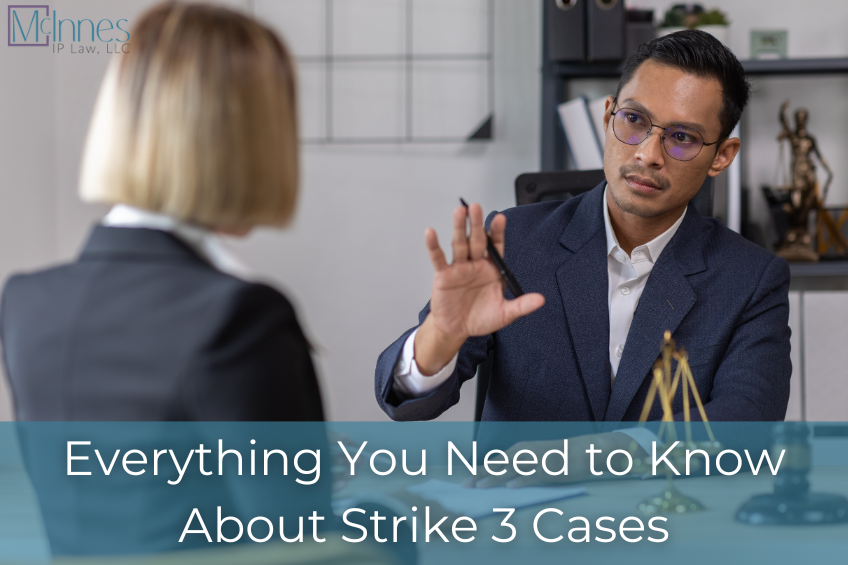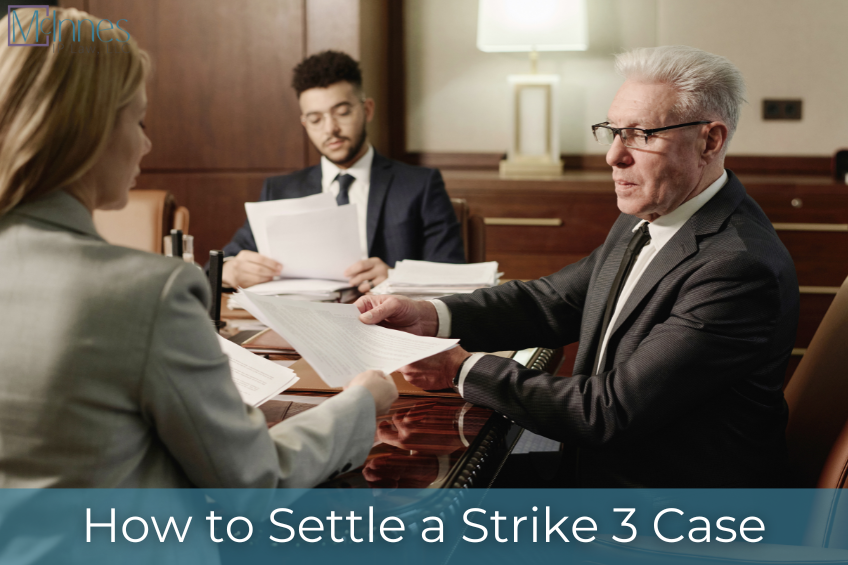Strike 3 cases are on the rise nationwide. If you’ve received a notice from your internet service provider (ISP) about a subpoena related to a Strike 3 case, you’re not alone—and you shouldn’t ignore it. Strike 3 Holdings is known for aggressively pursuing individuals accused of downloading or sharing adult content without permission via BitTorrent.
These cases often move quickly, and many people don’t realize that their IP addresses can be publicly tracked. In this post, we’ll explain how Strike 3 cases work, why ISPs comply with court orders, and what you can do to protect your privacy and respond strategically with the help of a lawyer.
What We’ll Cover:
- What is Strike 3 Holdings?
- How do Strike 3 cases typically start?
- Is BitTorrent data publicly accessible?
- Why do Internet Service Providers cooperate with Strike 3?
- Key takeaways
- Legal representation
What Is Strike 3 Holdings?
Strike 3 is an adult film company in California that owns and distributes adult motion pictures. Strike 3 customers use BitTorrent software to download the content. When the Strike 3 content is downloaded without payment or permission, Strike 3 uses information from the BitTorrent download to identify a user’s IP address that was used to download content.
Once an IP address is identified, Strike 3 initiates a court action and issues a subpoena to the internet service provider (“ISP”) to direct the ISP to provide the identity of the owner of the IP address that has allegedly and illegally downloaded the content. Upon receiving the subpoena, the ISP provider will send a notice to the ISP holder or subscriber, notifying them of the subpoena and providing a date by which the ISP provider will respond to the subpoena and release the ISP holder’s identity.
It is at this point that you have an opportunity to resolve the issue before Strike 3 uses your identity to name you in a federal lawsuit, which is open to the public. The two main options to keep your identity out of the public domain are to file a motion to quash the subpoena and keep the ISP provider from sending the information to Strike 3 or to attempt to negotiate a settlement before Strike 3 files a Complaint naming you as the defendant.
How Strike 3 Cases Typically Start
Once your ISP provides your identity, Strike 3 may initiate another court action naming the IP address owner in a Complaint that is open to the public. Strike 3 is seeking compensation for the unlicensed download of its content.
If you receive a letter from your ISP provider notifying you that it is about to release your information to Strike 3, do NOT ignore it. You risk being named in a federal Complaint in which Strike 3 will allege you may owe tens of thousands of dollars for downloading illegal content.
Strike 3 employs seasoned attorneys to pursue these matters. The Strike 3 attorneys have experience pursuing these cases, are experts in copyright law and have filed thousands of cases in federal Court throughout the country.
Do You Need Legal Representation Against Strike 3 Holdings?
BitTorrent Data is Publicly Accessible, Including Your IP Address
Strike 3, and its customers use BitTorrent technology to download large files, whether legally or illegally. BitTorrent is a communication protocol for peer-to-peer file sharing. If the BitTorrent download lacks a license or permission, Strike 3 will be able to identify the IP addresses that have allegedly downloaded Strike 3 content without payment.
BitTorrent is one of the most common protocols for transferring large files, such as digital video files containing movies, video clips, or digital audio files. That’s why Strike 3 can successfully use BitTorrent to identify illegal downloads of its content and identify the people responsible.
Because of the nature of BitTorrent technology, Strike 3 may take the position that anyone who illegally downloads Strike 3 content also distributes the content while downloading. Strike 3 may argue that distributing the content allows Strike 3 to collect enhanced damages because it potentially allows the ISP holder to profit from the distribution.
Why Does Your ISP Cooperate with Strike 3?
Absent a court-issued subpoena, your internet service provider (“ISP”) would most likely ignore a request for an IP owner’s identity. However, once a court issues a subpoena, your ISP has an obligation to provide the requested information because of the requirements of the Digital Millennium Copyright Act (“DMCA”).
Pursuant to the DMCA, if the ISP does not cooperate with a subpoena, it will become liable for activity conducted on the ISP platform. Therefore, once in receipt of the subpoena, the ISP will provide notice to the IP owner that their identity will be provided by a certain date, unless the IP holder files the appropriate objection with the Court.
Due to the number of lawsuits Strike 3 initiates, ISP providers have become very efficient at processing and responding to subpoena requests. That’s why it’s important to take steps to resolve Strike 3 matters as soon as possible if you receive a notice from your ISP provider.
To avoid disclosing your identity to Strike 3, contact an attorney to file the appropriate objection or resolve the dispute.
Key Takeaways
- Strike 3 is an adult film company in California that owns and distributes adult motion pictures. Strike 3 uses BitTorrent technology to identify a user’s IP address that downloaded content, legally or illegally.
- Suppose you are identified as having allegedly downloaded Strike 3 content without proper payment. In that case, you will receive a notice from your ISP provider informing you that the ISP provider will respond to a Strike 3 subpoena and provide your identity to Strike 3.
- Ignoring the lawsuit can make things worse. If you do nothing, your ISP will disclose your identity, increasing your legal risks.
- Your ISP provider has an obligation to respond to a Strike 3 subpoena issued by the federal Courts.
- Quick action can help protect your privacy. If you respond strategically, you may be able to settle discreetly or challenge the lawsuit before it escalates.
- An experienced lawyer can make a difference. An experienced lawyer can assess your situation, explain your options, and help you resolve the case in the best possible way.
Take Action Now – Contact Us for a Free Consultation
Time is critical in these cases, so don’t wait. Contact us today for a confidential consultation and take control of your defense.
Call (774) 234-1256, email us at info@mcinnesiplaw.com, or message us on our LinkedIn Company Page to get in touch.
Disclaimer: This blog is for informational purposes only and does not constitute legal advice. Every case is different. For specific guidance, consult an attorney experienced in copyright law.



